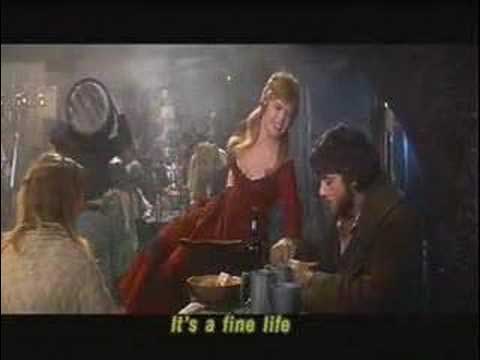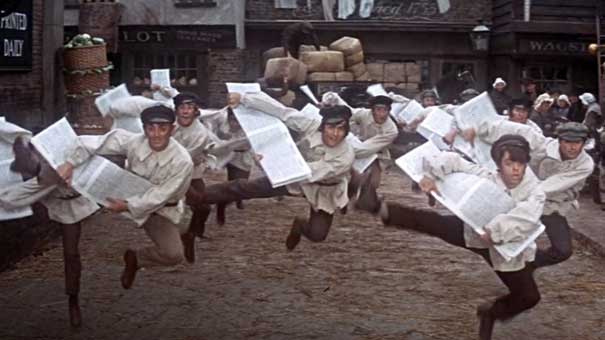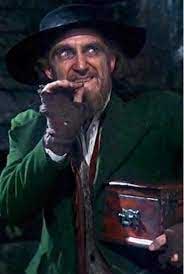
Nancy (Shani Wallis) with Bill Sikes (Oliver Reed)
On Saturday 16 August 2025 BBC TV screened the musical film Oliver! I first saw it when it came out. My partner Jill saw it onstage in the 60s with Georgia Brown as a superb Nancy. We have a CD of the film score that came free with a newspaper, picked up at a charity shop. And we have seen family members perform it at a school play.
But seeing Carol Reed’s directorial masterpiece Oliver! (1968) again was a revelation. The bittersweet story of young Oliver Twist, the amazing dark underworld of Fagin, Bill Sikes, Nancy, the Artful Dodger. The stingy brutality of DoTheBoysHall school, the rough and tumble of the undertakers, and above all the joyous celebration of London’s street life was a wonderful eye-opener.

Still from the “Who Will Buy?” sequence
You only have to see the amazing song and dance routine in Lionel Bart’s song “Who Will Buy?” to appreciate its celebratory joyousness! This has the wonderful polyphony by musical arranger and conductor Johnny Green and the fantastic choreography by Onna White, all filmed at Shepperton.
This song goes from “Who will buy roses and strawberries ripe?”, to “who will buy this wonderful morning?” with all the joys of life, sung poignantly by boy soprano Mark Lester as Oliver. The polyphony rivals that of the great baroque masterpieces and classical opera.

Ron Moody as Fagin
In my mind I compared Oliver! With The Threepenny Opera (1931) film directed by G. W. Pabst, adapted from the Brecht/Weill stage musical and starring Lotte Lenya as Polly Peachum.
Shani Wallis as Nancy in Oliver! is no Lotte Lenya, but the girl from Tottenham did good! She gave an unexpectedly powerful and earthy performance which fitted the film perfectly.
Is it crazy to compare it with The Threepenny Opera (1931)? The latter is rooted in Brecht’s Marxist critique. It portrays capitalist society as corrupt at every level; police, beggars, businessmen, and criminals all collude. Crime and commerce blur. Capitalism itself is the crime. But Oliver! Shows class injustice; workhouses, child exploitation, poverty, but often sentimentalizes it. Its philosophy is that social evils exist, but charity and moral reform can address them.
The Threepenny Opera focuses on the urban underclass in Weimar Germany, exposing how social structures breed exploitation. Marriage, friendship, and loyalty are transactional. Brecht/Pabst use cynicism and alienation to prevent any emotional identification with characters, forcing viewers to see society’s mechanics rather than individual fate. Morality is a bourgeois illusion masking power and profit.
Instead, Oliver! reflects a Victorian/Edwardian moral framework: innocence (Oliver) contrasts with corruption (Fagin, Sikes). But community emerges as a potential safe haven, both with the Brownlow household, and the albeit cynical Fagin and Dodger’s camaraderie, in their Den of Thieves.
The Threepenny Opera is nihilistic and anti-humanist: human motives are greed, survival, and hypocrisy. Oliver! embodies Romantic humanism: goodness and innocence exist, embodied in Oliver. Evil is individualised; not systemic, human goodness survives despite corruption.
But Oliver! also engages in the celebration of everyday life. Numbers like “Consider Yourself” and “Oom-Pah-Pah” celebrate community, camaraderie, and working-class resilience. Even in poverty, there’s vibrancy, humour, and collective energy. This is a festive counterweight to the bleakness, a form of social affirmation through culture. Dickensian London is shown not just as cruel but also bustling and alive. There is also a parody of authority. Mr. Bumble and Widow Corney are satirical caricatures of petty authority, more ridiculous than threatening. Military pomp and establishment rituals are mocked through excess and caricature, even in the march of the young pickpockets, exposing the absurdity of hierarchical power. There is also the wit and depth of Lionel Bart’s lyrics, even though they are deceptively light. They combine childlike singability with sharp social commentary. Thus “Food, Glorious Food” turns hunger into a witty chorus on deprivation. Songs work on two levels: both entertainment and critique, not unlike Brecht’s use of irony, but softened by warmth and humour. They embody a kind of popular wisdom, blending joy with biting observation.
Oliver! is superb in spectacle and choreography. Reed’s film transforms the stage musical into a cinematic spectacle: vast sets, fluid choreography, bustling street scenes, a celebration of survival through creativity. It embodies a celebration of the people as political gesture The mass numbers (“Consider Yourself”, “Who Will Buy?”) don’t just entertain — they stage the collective vitality of ordinary people. They offer solidarity through song and dance. This must have inspired Danny Boyle, in his wonderful 2012 Olympic opening ceremony.
In contrast, in The Threepenny Opera, spectacle is deliberately restrained, even alienating. It refuses to seduce with beauty. Instead, it confronts with irony and estrangement. Choreography is minimal, movement is stiff, theatrical, often meant to highlight artificiality. However, the great poignancy of the songs and Lotte Lenya’s superb performances evoke empathy and joy in their savage beauty and anger. You feel her pain; you feel her anger against injustice. They lift the film. They are a big part of what makes the film great and not just tractarian. All this is rests on the superb music of Kurt Weill.
Oliver! uses song, wit, parody, and spectacle to affirm human resilience and joy even amid suffering. Its critique is softened by warmth and theatrical vitality. It bends toward humanist affirmation through spectacle. The spectacle itself is political; it says these lives matter; these communities have richness and dignity.
Aesthetically, as a whole experience, re-viewing Oliver! is a joyous life affirming experience. It does not hide the dark side. But it affirms that viewing a musical, a film or a stage performance is ultimately an integrated aesthetic experience, one that brings joy plus layers of intellectual and aesthetic appreciation to an audience. It is so much more than just a message. This makes me begin to appreciate what Opera enthusiasts enjoy so much, in theory at least. So many art forms: music, dance, choreography, theatre, narrative, spectacle, social and political content merged and unified into a single artwork, a single performance.
There are many filmed musicals of social critique. Great ones include Cabaret (1972) set in the decadence of 1930s Berlin against the rise of fascism; West Side Story (1961) critiquing racism, immigration, and gang violence in New York City, not to mention social work and policing. South Pacific (1949) is another, treating racism and colonial attitudes in the Pacific. Less great, there are many more worthy of mention such as Les Misérables (2012) foregrounding injustice, poverty, against the background of revolutionary struggles in 19th-century France.
Oliver! stands shoulder to shoulder with the great musicals and richly deserves all the Oscars it won. In a 1960s Britain still marked by post-war austerity and class stratification, this was quietly radical: presenting the working class not as pitiful but as vibrant, witty, and resourceful. This is a belated thank you to all its makers and stars.
.
Paul Ernest
18 August 2025
.

Wow
I feel I should watch it again after reading this. I generally struggle with musicals – Cabaret and New York New York excepted – but I hated Oliver …. it’s just below ET as my all-time disliked movie. For me (watching it as a child) it was the obvious poshness and pristine appearance of Oliver himself. I don’t blame the kid who played him, obviously, but like the stranded alien in ET, I wanted him done away with from the moment I saw him …. I love Brecht by the way, his poetry in particular, and the alienation present in his drama is a political and aesthetic choice …. Harry Secombe as Mr Bumble created a lifelong aversion to him
Thanks for the review though x
Comment by Steven Taylor on 30 August, 2025 at 7:19 amThanks, Steven, yes for years I was unsympathic to musicals, the original Three Penny Opera excepted. This tied in with being unsympathetic to old popular music. If it wasn’t blues or jazz or rock, although I made an exception for good folk music, it was out. But largely through the influence of my partner Jill I have learned to appreciate musicals and the lyrics and music of the Great American Songbook (and its UK counterpart such as in the soundtrack of Pennies from Heaven TV series). I climbed down off my high horse of snobbery – only the cool, the edgy would do! That was me. But seeing Oliver! again, unplanned, on BBC TV blew me away! It has a joyous populism that was so perfectly expressed in the 2012 Olympic Opening performance. We can enjoy and be proud of the life and achievements of ordinary people. Grayson Perry expresses it in his celebration of the Essex woman Julie. Thanks for the heads up on Brecht’s poetry – never read it – although I know some of his plays a bit!
Comment by Paul Ernest on 15 February, 2026 at 8:24 am